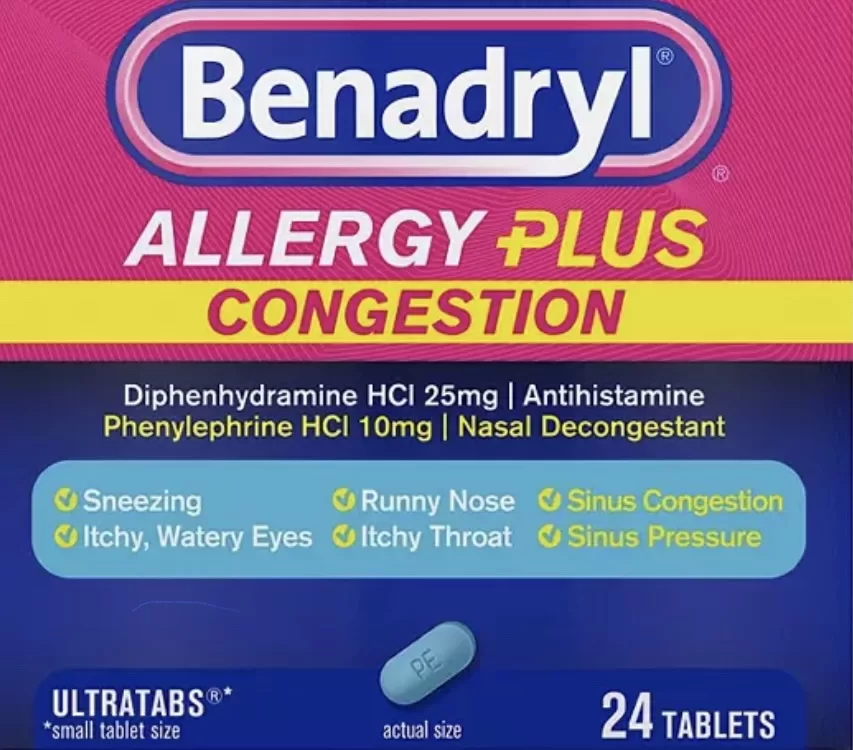Benadryl For Cats. Better safe Timely
Cats are wonderful companions, but they can also experience ailments like humans. Benadryl is a common medicine to treat various conditions in humans. However, you may need to learn that your veterinarian sometimes prescribes it for cats. In this blog post, we will look at the potential applications of Benadryl for cats. When it is necessary and safe to use it to treat them. The break from how much dosage your pet needs and more. Read on to learn everything you need to know about using Benadryl for cats.

What is Benadryl?
- It is a common brand-name drug that has long been used in the US to relieve allergies, hives, and other conditions.
- Benadryl is most brand’s active ingredient and primary component of an antihistamine.
- Benadryl for cats treats itching due to insect bites, and skin problems. Such as flea allergies or ringworm, seasonal or food allergies, and heaving cough.
- To be specific, Benadryl or other antihistamines are safe and effective for cats. However, please get in touch with your vet before administering any drug to your cat.
Can cats have Benadryl?
There is a lot of debate surrounding Benadryl and cats. While giving your beloved feline an over-the-counter medication may be tempting. It is essential to remember that such human medications can be toxic for cats. Cats cannot metabolize many drugs the same way humans can. So it is essential to get the advice of a veterinarian before administering any over-the-counter medication.
Some veterinarians believe that Benadryl should use in tiny amounts. It may help with minor allergic reactions or as a sedative. Still, these treatments should only be carried out under the close supervision of an experienced vet after assessing your cat’s condition.
How to Give Benadryl to Cats?
Benadryl can be a helpful solution for cats who need relief from allergies, itching, and minor skin irritations. When using Benadryl for cats, it is essential to follow instructions closely to ensure that your cat receives the correct dosage and does not experience any adverse reactions. Generally, Benadryl can be given every 8-12 hours at a 1mg/pound dosage rate.
Benadryl comes in tablet, caplet, liquid and injection forms. However, most veterinarians advise against giving Benadryl injections to cats due to the potential of overdosing or causing other harm. Benadryl is an effective form of relief. However, it should only be used when directed by a veterinarian. As cats are sensitive creatures. Benadryl can cause significant harm if administered incorrectly or too often.
| Medication details |
|---|
| Medication type: Antihistamine, Anti-nausea |
| Form: Liquid, Capsule, Tablet, Injection |
| Brand names: Benadryl, Diphenhist, ZzzQuil, Vetadryl, Banophen |
| Common names: Diphenhydramine; Often labeled as Allergy Relief or Sleep Aid under various store names |
| Available dosages: Liquid: 12.5 mg/5 mL (2.5 mg/mL); Capsules: 25 mg, 50 mg; Veterinary Tablets: 10 mg, 25 mg, 30 mg; Human Tablets: 25 mg, 50 mg; Injection: 50 mg/mL |
Benadryl Dosage for Cats
| Animal weight | Children’s liquid (12.5mg / 5ml) | Tablets (25Mm) |
|---|---|---|
| 5 | 2ml | 1/4 tablet |
| 8 | 3ml | 1/4 tablet |
| 10 | 4ml | 1/4 tablet |
| 13 | 5ml | 1/2 tablet |
| 15 | 6ml | 1/2 tablet |
| 20 | 8ml | 1/2 tablet |
| 25 | 10ml | 1 tablet |
What is Benadryl Used For?
- Benadryl may be prescribed for feline allergies, urticaria, itching or swelling, and motion sickness. As an adjunct to anxiety treatment, an antihistamine for atopy dermatitis, or even for its soothing effects.
- Benadryl, or Diphenhydramine Hydrochloride, is commonly used to treat allergies and relieve cold and flu-like symptoms.
- It can be given by mouth in the form of liquids or tablets taken orally and should never be applied topically.
How does Benadryl work?
Benadryl is an antihistamine drug commonly used to relieve physical symptoms related to allergies. Such as itching, sneezing, or runny nose. The main active ingredient in Benadryl is diphenhydramine hydrochloride. Which produces its desired effect by blocking histamine receptors and decreasing the body’s reaction to allergens.
It also has some soothing properties that help people with sleep issues such as insomnia. By blocking the action of histamine throughout the body. Benadryl helps alleviate physical reactions caused by allergies and assists in providing relief from accompanying discomforts.
Benadryl for cats: Side Effects
Hyperexcitability
Vomiting and Diarrhoea
Constipation
Loss of appetite
Changes in Urination
Most common side effects
Lethargy and possible sedation
It is important to note that Benadryl can have various side effects depending on your cat’s size and current health. Though not all cats will experience side effects from Benadryl. Some common ones include tiredness and drowsiness, Sedation, dry mouth and throat, Diarrhea or vomiting, and rarely confusion or loss of balance.
More severe side effects, such as changes in heart rate can occur. If higher than the recommended dosage use. So it is best to talk to your veterinarian before giving your cat any medications.

Reactions with Other Drugs and Medications
Reactions between Benadryl and other drugs and medications can occur when given to cats. So it is important to check with your vet before administering the medication. Reactions may occur due to the prolonged use of various other drugs and medications. By a combination of different drugs used simultaneously.
Knowing any adverse reactions that could arise will help determine if Benadryl is safe for your cat. As with any new drug or supplement, you should familiarize yourself with potential side effects that may result from administering Benadryl to your pets.
What are Allergic Reactions in Cats?
Many different substances can trigger allergic reactions in cats. These include everything from air pollutants to flea saliva and food sensitivities. Symptoms of allergic reactions usually manifest as skin irritation, such as hair loss or scabbing, itching and sneezing.
In severe cases, cats can experience respiratory problems or vomiting after exposure to an allergen. If a cat exhibits any suspicious symptoms, it is important to visit a veterinarian for diagnosis and treatment to help reduce the discomfort for your pet.
Symptoms of Allergic Reactions in Cats.
- Allergic reactions in cats can lead to symptoms, some of which can range from mild to severe.
- Cat owners should be aware of certain signs such as feeling under the weather, itchy skin, rashes, bald patches on the fur, or excessive scratching and licking at their fur or skin.
- In some cases, a cat may also have swollen eyelids, face or limbs and sneezing, coughing or wheezing.
- Foods, pollen, dust mites or other environmental factors can trigger allergic reactions. Pet owners must distinguish between these allergic reactions and any other medical conditions their cats might experience.
Suppose a cat owner notices any out-of-the-ordinary behaviours from their pet accompanied by any of the symptoms above.
Allergy reactions to Medicines and Vaccines.
Allergies in cats can have many causes, from environmental factors like dust and dander to reactions to medicines and vaccines. Benadryl is commonly used to treat cat allergies, as it is an antihistamine that blocks the histamine response from the body’s immune system. Benadryl can be given in tablet form or liquid solution and should be prescribed by a veterinarian, as dosage levels may vary depending on weight and other factors. Allergies are not something to take lightly. If your cat has any signs of an allergic reaction. It is essential to seek immediate medical attention to mitigate any long-term effects.
Feline Allergies Regarding Bug Bites
Feline allergies related to bug bites are becoming increasingly concerning. Although cats are usually thought of as low-maintenance pets. They can be significantly affected by parasites, ticks and fleas, leading to allergic reactions.
Symptoms include excessive itching and redness of the skin, which can cause extreme discomfort for the pet. To ensure your cat’s health and safety from these kinds of allergies. It is important to regularly groom and inspect your furry companion to prevent infestations from occurring. Furthermore, take your cat for regular medical checkups with a veterinarian to ensure any potential problems are addressed promptly; this will help protect your cat from further complications or distressed feelings associated with the allergy.
Anaphylactic shock symptoms are described below.
Anaphylactic shock is a severe and life-threatening allergic reaction caused by exposure to a foreign substance. Symptoms can include hives, swelling of the face and tongue, difficulty breathing, chest tightness, abdominal pain, nausea and vomiting.
Benadryl is commonly given to cats with anaphylactic shock as it helps reduce the severity of some symptoms. Due to its potential side effects, however, Benadryl should only be given under the direction of a veterinarian. Identifying and addressing allergens that may trigger anaphylaxis quickly is critical to prevent fatal consequences.
Is Benadryl Used for Sedation?
Benadryl, also known as diphenhydramine, is a sedating medicine that relieves allergies and other minor illnesses. It is also used for treating insomnia, motion sickness, and nausea and can sometimes be given to cats as a sedative. In humans, Benadryl reduces the excitability of nerve receptors by blocking histamine. Which then causes a relaxing effect in the body. This exact mechanism occurs when it is given to cats. Although the dosage amounts can vary depending on the size of your cat.
What is Diphenhydramine in Benadryl?
Diphenhydramine is an active ingredient in Benadryl, a popular antihistamine used to treat hay fever, allergies and other minor illnesses. It works by blocking the effects of histamine, a substance produced by the body during an allergic reaction. As an antihistamine, diphenhydramine helps to reduce symptoms such as sneezing and itching.
In addition to treating allergies, it can also be used to alleviate symptoms of anxiety or insomnia due to its sedating effect. Diphenhydramine is available for over-the-counter purchase in tablet form with different concentrations of the active ingredient depending on the product. A doctor’s prescription may be necessary for larger doses and more severe cases.
Why Do Feces take Benadryl?
Benadryl is a common medication used for treating allergies in cats. This medication is often recommended and administered by veterinarians due to its potency, effectiveness, and safety, with side effects being relatively rare. Benadryl functions by blocking the receptors that trigger histamines so that there is no reaction from the allergen. While Benadryl has been extensively tested as a safe drug for cats in short periods. It should never be administered without consulting with a vet first as it carries potential risks. Such as increased Sedation and drowsiness, heart palpitations and trembling abdominal discomfort or vomiting. However, when used properly, Benadryl can effectively ease your cat’s suffering from feline allergies.
When not to Use Benadryl
Benadryl is a common medication with many uses. But it is essential to know when it should not be used. Giving Benadryl as an appetite stimulant or a sedative for cats could lead to serious medical complications requiring emergency attention from a veterinarian. Additionally, Benadryl may not be indicated for those suffering from certain medical conditions, including asthma and glaucoma.
Furthermore, Benadryl should also not be taken if a doctor has not prescribed allergy medications. Following these instructions will help ensure symptoms improve without adverse reactions due to taking Benadryl inappropriately.

How Much Benadryl Can I Give a Cat?
When deciding how much Benadryl to give to a cat. It is important to consult a veterinarian first. Generally, cats should be given (1 mg per pound ) of body weight up to three times daily. If the cat is tiny (less than 5 pounds), it’s best to err on caution and only administer half of the prescribed dose. Additionally, make sure that Benadryl contains only diphenhydramine as an active ingredient, not a combination drug like Tylenol PM or Ibuprofen. Finally, it’s important to never exceed 6 doses in 24 hours since an overdose could lead to serious health issues for your pet.
What kind of Benadryl do I Give my Cat?
Diphenhydramine (brand name: Benadryl®, Vetadryl®, Banophen®, Genahist®, Diphenhist®, Unisom®, Sominex ®) is an antihistamine used in cats, dogs, ferrets and other small mammals, birds, horses, and cattle to treat allergic reactions, motion sickness, and vomiting.
NATURAL ALTERNATIVES TO BENADRYL FOR CATS
Many cat owners may look for natural alternatives to Benadryl for their feline friends. As the drug can cause various side effects. It is important to note that non-drug alternatives may not always work as quickly or effectively as traditional pharmaceuticals. Still, some options, such as herbs like chamomile and valerian, can bring relief when used in appropriate doses.
Additionally, some owners find that a change in diet has helped with allergies and itching. In contrast, others have seen positive results when using natural supplements like fish oil. It is known to have anti-inflammatory benefits. While these alternatives may not always provide instant relief. They are worth exploring if you avoid Benadryl or other medications.
Acidophilus
Acidophilus is a great natural alternative to Benadryl for cats. It is a type of probiotic that can help cats and other animals soothe their skin irritation and boost the absorption of nutrients. Acidophilus is found naturally in yogurt. But it’s available in powder and capsule forms at your local pet store.
Suppose your cat needs relief from hay fever or allergy symptoms. In that case, Acidophilus can be safely administered orally and as a topical ointment. Making it an ideal, natural replacement for traditional treatments like Benadryl. Acidophilus helps restore balance to the gut microbiome, ensuring your cat stays healthy inside and out.
Coconut oil
Coconut oil is one such remedy that has gained attention for its anti-inflammatory properties. It helps reduce swelling associated with allergic reactions and boosts immunity in cats. Adding coconut oil to your pet’s food or applying it topically may help soothe their skin without needing antibiotics or other medications. And while it may not be a silver bullet cure-all solution, when used properly. Coconut oil can be an effective option in naturally treating some of your cat’s ailments.
Chamomile
Chamomile is one of the more popular herbal remedies for allergies and can help soothe itching due to environmental irritants. It also has calming properties, which make it beneficial for stressed cats. It’s important to note that the Food and Drug Administration does not regulate herbs. So it’s best to speak with your vet before administering chamomile or other natural remedies instead of Benadryl.
Fish Oil
Fish oil is a natural alternative to Benadryl for cats. It is known to have potent anti-inflammatory properties. It can help reduce symptoms such as itchiness and sneezing in cats. Fish oil also contains omega-3 fatty acids, essential for keeping your cat’s coat shiny and healthy. Fish oil can give via an oral supplement or applied topically to the skin. If you decide to give your cat fish oil. Consult your veterinarian first to ensure that it’s the right choice for your feline friend. Fish oil may be a beneficial solution for allergic reactions in cats and can offer a safe life.
FAQ
Is it safe to give cats Benadryl?
Answer: Yes, Benadryl is safe for Cats.
Can Cats take Benadryl if they take other Medications?
Answer: Cats can take Benadryl if they are also taking other medications. However, it is important to consult a veterinarian before giving your cat any medications. When determining whether to give Benadryl or another medication to a cat. The active ingredients and dosage should be taken into serious consideration to ensure that the cat’s health is not negatively impacted.
In general, Benadryl (diphenhydramine) is safe for cats. As an antihistamine and sedative as long as it is used at appropriate dosages based on the size of your pet. It can be administered orally (usually mixed with food) or topically in cream form. The recommended dosage for oral administration of diphenhydramine hydrochloride ranges from 2-4mg per kg).
Can you give a cat Benadryl for Anxiety?
Answer: Yes, Benadryl can be given to cats for anxiety. Benadryl is an antihistamine commonly used to treat cat allergies. But can also be used as a sedative to help reduce anxiety. It is important to note that Benadryl cannot be used for long-term anxiety management as it can cause side effects in cats.
Tell me the best way to treat Benadryl.
Answer: The best way to treat Benadryl in cats is to give it orally, usually mixed with food.
Should I use Benadryl for my cat allergies?
Answer: The answer is yes. However, it is important to consult your veterinarian before administering any medication.




